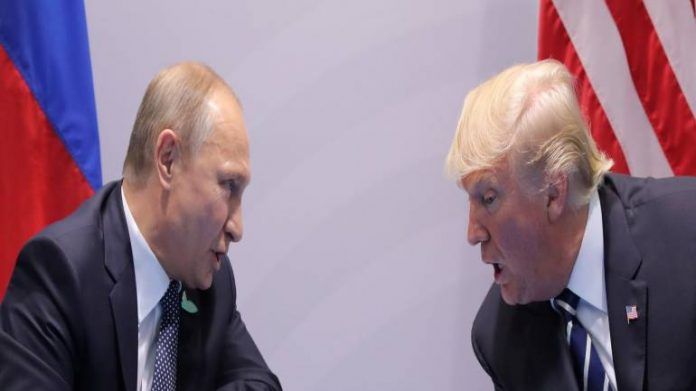But new indictments from an investigation into alleged Russian interference in US politics have dropped with embarrassing timing, focusing attention again on whether the Trump campaign may have benefited from Putin’s covert help to win the White House.
Before coming to Europe, US President Donald Trump raised eyebrows by predicting that Monday’s historic Helsinki summit with Russian counterpart Vladimir Putin would be the “easiest” stage of his tour. The rest of his trip, to Brussels and Britain, has indeed crackled with controversy so far.
But new indictments from an investigation into alleged Russian interference in US politics have dropped with embarrassing timing, focusing attention again on whether the Trump campaign may have benefited from Putin’s covert help to win the White House.
And it is far from the only charged issue to loom over the two leaders’ first full-blown encounter.
British accusations that Russia unleashed a deadly nerve agent in an English city, the fears of NATO allies that Trump is not serious about defending the Western alliance, and Putin’s support for the Syrian regime after years of civil war also form part of the crowded backdrop.
Putin will head to the Finnish capital on a diplomatic high after presiding over today’s World Cup final in Moscow, basking in the glow of a trouble-free tournament that burnished Russia’s credentials.
Ahead of the leaders’ first one-on-one summit, the Kremlin said it considers Trump a “negotiating partner”.
“The state of bilateral relations is very bad,” Kremlin adviser Yuri Ushakov said on Friday. “We have to start to set them right.” Trump meanwhile teed up the summit with a quiet weekend of golf at one of his courses in Scotland, a calm end to his stormy visit to Britain, where he shocked his hosts by attacking Prime Minister Theresa May’s strategy for Brexit.
The visit heaped more trouble on the transatlantic alliance after Trump ripped into NATO leaders in Brussels for not spending enough on defence, and rebuked Germany for building an energy pipeline from Russia which he said would leave Europe’s biggest economy beholden to Moscow.
Trump was dogged by protests during his four days in Britain, and more are scheduled in Finland.
But this time Trump will share the opprobrium with Putin, with the biggest rally — dubbed “Helsinki Calling!” — on Sunday to focus on issues that demonstrators say both presidents neglect: human rights, democracy, freedom of expression, inequality and the fate of refugees.
All eyes Insight into their relationship will be on offer when Trump and Putin hold a joint news conference on Monday afternoon after their meeting in the Gothic Hall of the Finnish presidential palace.
The talks are set to begin with only their interpreters in the room, before opening up to their delegations over a working lunch.
Allies are nervously waiting to see if Trump sidles up to the canny Russian leader in the same way he has embraced other autocrats such as China’s Xi Jinping, and even North Korea’s Kim Jong Un.
“Putin has proven himself to be incredibly savvy at reading personalities and characters,” said Alina Polyakova, a foreign policy fellow at the Brookings Institution in Washington, noting that Putin was trained as a KGB spy.
“He will praise Trump and try to bond with him in sort of a mano-a-mano way. Trump will be responsive to that tack,” she said.
On Friday, Trump said: “I’m not going in with high expectations, but we may come out with very surprising things.” He also insisted that he had been “far tougher” with Russia than has been recognised by the “dishonest” media, and would “absolutely” bring up the question of election meddling.
Shortly after, news broke of the indictments of 12 Russian military intelligence agents for hacking Democrats during the 2016 elections.
Democratic leaders quickly called for Trump to cancel the summit in light of the indictments.
After that suggestion was rebuffed by the White House, the Democrats said Trump should at least ensure his national security team is alongside him with Putin at all times, “not wing it on your own”.
Some in Washington — along with US allies — are worried about what Trump might bargain away after he used a stormy G7 summit in Canada to ponder whether it was time to readmit Russia to the club and move past sanctions imposed over Moscow’s seizure of the Crimea region from Ukraine.
Putin has less reason to cheer from Trump’s imposition of trade tariffs on countries including Russia, and from his decision to abandon a nuclear pact with Iran.
Trump also says he intends to pressure Putin over the rapid growth and modernisation of Russia’s nuclear arsenal.
But for Putin, merely getting Trump to sit across the table counts as “an informal recognition of Russia as a great power”, political analyst Alexei Malashenko said.


